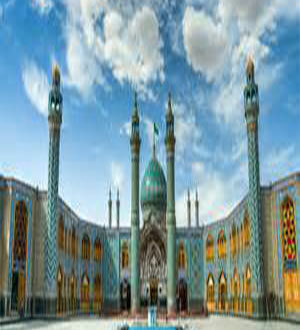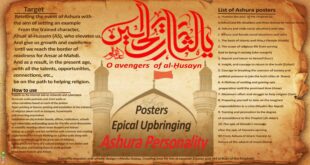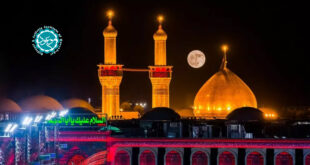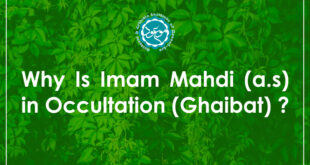Shi’a
Those who consider Imam Ali ibn Abu Talib (a.s.) as immediate caliph and successor of the Holy Prophet (S) are called Shi’a. The Imamiyeh Shi’a regard Imam Ali ibn Abu Talib (a.s.) and his eleven infallible sons as Imam and leaders and obey their sayings and deeds. A true Shi’a is someone who follows Imam Ali (a.s.) and infallible Imams (a.s.) and their narrations and deeds as their model. Imam al-Baqir (a.s.) said to Jabir: “O Jabir! Is it sufficient for a person only to say this much amount that: ‘I am a lover of Ahl al-Bayt (a.s.)?’
By God he is not our Shi’a but that he should be pious and obey God. O Jabir earlier, my Shi’a were identified for these characteristics: Hospitability, being trustworthy, remembering God, prayer, fasting, goodness towards parents, helping neighbors and the destitute, orphans and those who were under debt, righteousness and being reciters of the Holy Qur’an. They did not say a thing about the people except goodness; they were trustworthy of the people.’
“Jabir replied: ‘O son of the Holy Prophet (S)! At this time I do not know any one possessing these characteristics.’ Imam (a.s.) replied: ‘O Jabir different beliefs should not make you confused and to fall down to commit a mistake. Is it sufficient for the prosperity of a person that he should hold to this much that: I am lover of Imam Ali (a.s.), but does not do God’s commandments? If someone says that: I am lover of the Holy Prophet (S) but does not follow his words and deeds, the friendship of the Holy Prophet (S) should not become the means of his prosperity while the Holy Prophet (S) was superior to Imam Ali (a.s.). O Shi’ah! Be afraid of God, and obey His commandments. God does not have family ties or relationship with anyone; the most honorable person near God is the person who is the most pious and foremost in performance of deeds. O Jabir! By God, there is no means of God’s nearness except obedience to His Commandments. Freedom from hell is not in our hands, whoever is obedient to God is our friend, and whoever rebels against God’s Commandments is our enemy. Our vicegerency (vilayat) is not obtained except through the means of righteous deeds and piousness.’”19
Imam al-Sadiq (a.s.) said: “Be pious and righteous; make endeavors in self-purification and cleansing and the performance of virtuous deeds; be truthful, trustworthy, and of pleasant conduct; treat yours neighbors kindly; through the means of your conduct and deeds, invite people towards the true religion. Be a source of our prestige and to keep our head high. With wicked deeds do not provide the means of our shame and degradation. Make your prostrations and genuflections prolonged; because when a slave prolongs his prostrations and genuflections, Satan becomes upset and cries: ‘O woe! They have done obedience and I have sinned, they prostrate but I refused to do prostration.’”20
Imam al-Sadiq (a.s.) said: “Disciples and helpers of Jesus (a.s.) were his Shi’a; but his helpers were not better than our Shi’a; because they gave him the promise to help but didn’t deliver their promise and did not fight in the path of God. But our Shi’a, since the demise of the Holy Prophet (S) until now never refuse from our helping and offered sacrifices for us; were burned in fire, were tortured and severely punished, and were exiled from their homes but did not hold their hands from our help and support.”21
Our Beliefs about Other Muslims
While we have differences of opinion with Sunnis with respect to the issue of caliphate and the succession after the Holy Prophet (S), we still regard all Muslims as our fellow brothers; our God is one; our book is the same and our Qiblah22 is the same.
We regard their dignity and progress as our own dignity and progress. We account their victory and domination as our own domination and their defeat and degradation is our own defeat and degradation. We are their partners in sharing their happiness and sorrows. In this act we take inspiration from our great leader Imam Ali ibn Abu Talib (a.s.); if Ali (a.s.) wanted to defend his legitimate right to take the caliphate he was able to do so, but instead preferred the general interest of Islam and preserving the religion. He not only confronted the caliphs, rather at the sensitive and required moments rushed to their help, and never refused from taking any step in the interest of Islam.
We believe that the Islamic world would only remain as a living and powerful nation, could retake its grandeur and majesty, rescue itself from the superimpositions of the aliens, only through taking distance from differences, concentrating its energy toward one objective and all of them should take giant steps in the path of advancement, grandeur and progress of the Islamic world.
1. Refer to Ghayat al-Mura’m, Ithbat al-Huda, Yanabi‘ al-Mawaddah, Sahhih Abu Da’wood, and Musnad-e Ahmad.
2. Al-Bidayah wa al-Nihayah, v. 5, p-208; a group of Holy Prophet’s (S) companions have narrated the story of Ghadir-e-Khum, this narration is continuous and certain and exists in the Shi’a and Sunni books. The relevant narration in the book of Ghayateh al- Mur’am, has been mentioned eighty nine ways from Sunnis and forty three times from Shi’a.
3. Man’aqib A’le Muhammad, Ibn Shahr’Ashub, v.2, p-108.
4. Bihar al-Anwar, v.41, p-52.
5. Ithbat al-Huda, v. 5, p-373.
6. Yanabi‘ al-Mawaddah, p-373.
7. Man’aqib A’le Muhammad, Ibn Shahr’Ashub, v. 4, p-19.
8. Ithbat al-Huda, v. 5, p-169.
9. Ithbat al-Huda, v. 5, p-212; Irsh’ad of Shaykh Mufid, p-238.
10. Man’aqib A’le Muhammad, Shahr ’Ashub, v. 4, p-153.
11. Ithbat al-Huda, v.5, p-263; Irsh’ad of Shaykh Mufid, p-245.
12. Kashf al-Ghummah, Printed in Tabriz, v. 2, p-337.
13. Ithbat al-Huda, v.5, p-328; Irsh’ad of Shaykh Mufid, p-254.
14. Irshad of Shaykh Mufid, p-254.
15. Kashf al-Ghummah, v.3, p-18.
16. Ithbat al-Huda, v.6, p-2; Irshad of Shaykh Mufid, p-285.
17. Ithbat al-Huda, v. 6, p-208; Irshad of Shaykh Mufid, p-308.
18. Ithbat al-Huda, v.6, p-269; Irshad of Shaykh Mufid, p-315.
19. Wafi, v.1, part-3, p-38.
20. Wafi, v.1, p-61.
21. Safinatul Bihar, v.1, p-73.
22. The direction of prayer i.e. Holy Mecca [Tr].

 Mouood Mouood English Edition
Mouood Mouood English Edition



